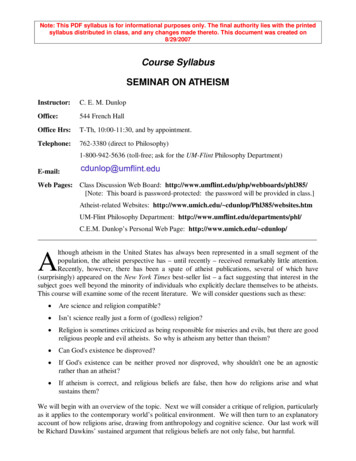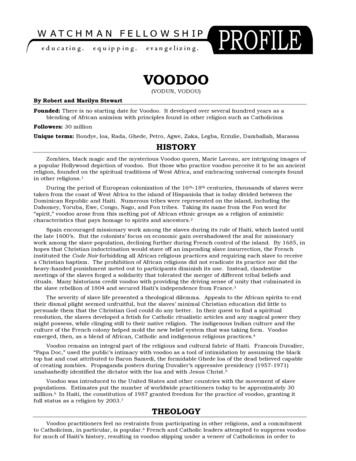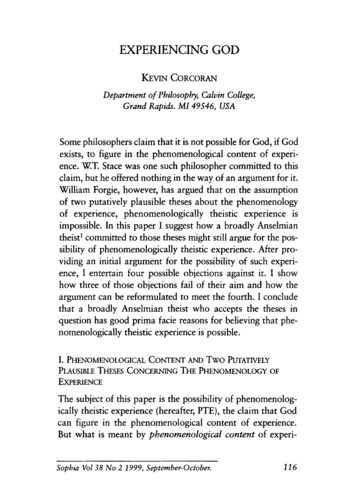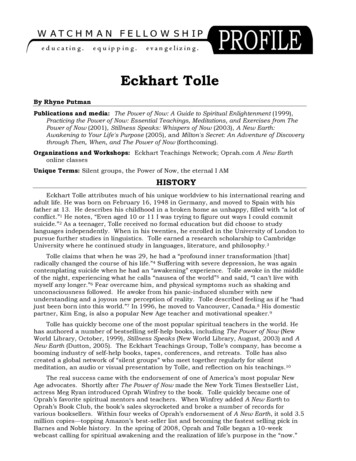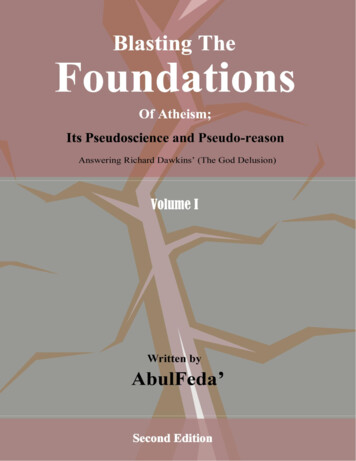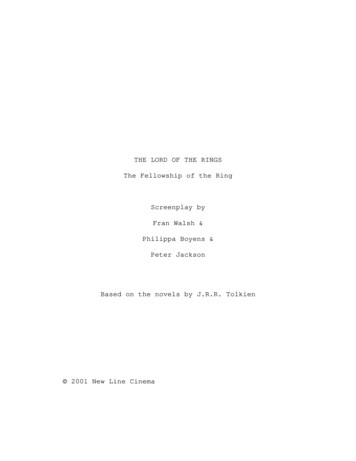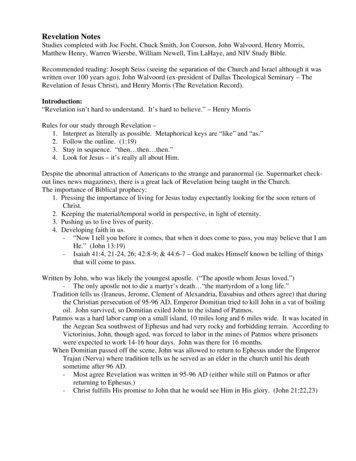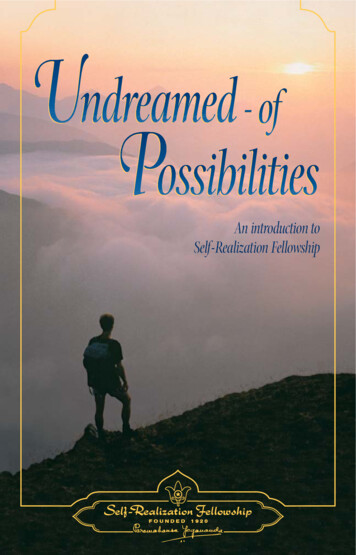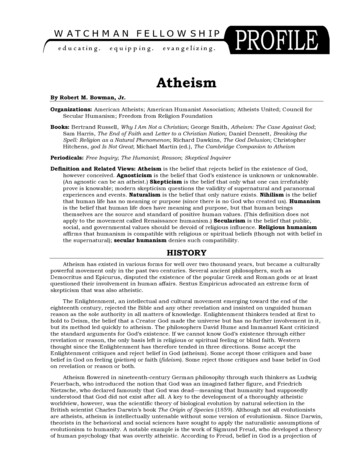
Transcription
AtheismBy Robert M. Bowman, Jr.Organizations: American Atheists; American Humanist Association; Atheists United; Council forSecular Humanism; Freedom from Religion FoundationBooks: Bertrand Russell, Why I Am Not a Christian; George Smith, Atheism: The Case Against God;Sam Harris, The End of Faith and Letter to a Christian Nation; Daniel Dennett, Breaking theSpell: Religion as a Natural Phenomenon; Richard Dawkins, The God Delusion; ChristopherHitchens, god Is Not Great; Michael Martin (ed.), The Cambridge Companion to AtheismPeriodicals: Free Inquiry; The Humanist; Reason; Skeptical InquirerDefinition and Related Views: Atheism is the belief that rejects belief in the existence of God,however conceived. Agnosticism is the belief that God’s existence is unknown or unknowable.(An agnostic can be an atheist.) Skepticism is the belief that only what one can irrefutablyprove is knowable; modern skepticism questions the validity of supernatural and paranormalexperiences and events. Naturalism is the belief that only nature exists. Nihilism is the beliefthat human life has no meaning or purpose (since there is no God who created us). Humanismis the belief that human life does have meaning and purpose, but that human beingsthemselves are the source and standard of positive human values. (This definition does notapply to the movement called Renaissance humanism.) Secularism is the belief that public,social, and governmental values should be devoid of religious influence. Religious humanismaffirms that humanism is compatible with religious or spiritual beliefs (though not with belief inthe supernatural); secular humanism denies such compatibility.HISTORYAtheism has existed in various forms for well over two thousand years, but became a culturallypowerful movement only in the past two centuries. Several ancient philosophers, such asDemocritus and Epicurus, disputed the existence of the popular Greek and Roman gods or at leastquestioned their involvement in human affairs. Sextus Empiricus advocated an extreme form ofskepticism that was also atheistic.The Enlightenment, an intellectual and cultural movement emerging toward the end of theeighteenth century, rejected the Bible and any other revelation and insisted on unguided humanreason as the sole authority in all matters of knowledge. Enlightenment thinkers tended at first tohold to Deism, the belief that a Creator God made the universe but has no further involvement in it,but its method led quickly to atheism. The philosophers David Hume and Immanuel Kant criticizedthe standard arguments for God’s existence. If we cannot know God’s existence through eitherrevelation or reason, the only basis left is religious or spiritual feeling or blind faith. Westernthought since the Enlightenment has therefore tended in three directions. Some accept theEnlightenment critiques and reject belief in God (atheism). Some accept those critiques and basebelief in God on feeling (pietism) or faith (fideism). Some reject those critiques and base belief in Godon revelation or reason or both.Atheism flowered in nineteenth-century German philosophy through such thinkers as LudwigFeuerbach, who introduced the notion that God was an imagined father figure, and FriedrichNietzsche, who declared famously that God was dead—meaning that humanity had supposedlyunderstood that God did not exist after all. A key to the development of a thoroughly atheisticworldview, however, was the scientific theory of biological evolution by natural selection in theBritish scientist Charles Darwin’s book The Origin of Species (1859). Although not all evolutionistsare atheists, atheism is intellectually untenable without some version of evolutionism. Since Darwin,theorists in the behavioral and social sciences have sought to apply the naturalistic assumptions ofevolutionism to humanity. A notable example is the work of Sigmund Freud, who developed a theoryof human psychology that was overtly atheistic. According to Freud, belief in God is a projection of
THE BEST RESOURCE COLLECTION ON CULTS AND RELIGIONSThe Watchman Fellowship ProfileNotebook provides you with an extensive personal library of information about cults, new and alternative religions, world religions, andreligious leaders. You will have atyour fingertips over twenty years ofresearch to answer your questions,strengthen your faith, and improveyour witness to others. Over 100 ProfilesOver 400 pages of informationThe history and primary teachings ofeach groupA Christian responseto deepen your faithand enhance your outreachClick here to order your copy of the watchman fellowship profile notebookBe sure to also order your free subscription to the Watchman Fellowship Profile. Several timeseach year you will receive a new, four-page Profile that you can add to your Profile Notebook, aswell as the latest news from Watchman Fellowship. Click here to order your free subscription!
Atheism, page 2the ideal father figure and thus a form of wish-fulfillment (compare Feuerbach). Most recently, somescientists have attempted to explain the mind, moral values, and even religious belief in purelybiological terms.Atheism became the worldview basis for powerful totalitarian ideologies in the twentiethcentury through the philosophy of the nineteenth-century atheist Karl Marx, whose CommunistManifesto (1848) inspired both the Bolshevik (Leninist) Revolution in Russia, leading to theformation of the Soviet Union, and the Communist (Maoist) Revolution in China.The major philosophical tradition of the twentieth century compatible with atheism in theEnglish-speaking world was analytic philosophy. The leading figure of this movement was BertrandRussell, whose book Why I Am Not a Christian (1927) continues to influence atheist thought today.What is distinctive about atheistic analytic philosophy is its claim that the very concept of God ismeaningless. Kai Nielsen and Michael Martin are two contemporary atheist philosophers workingfrom within the analytic tradition. Toward the end of the twentieth century, a group of Christianphilosophers—most notably Alvin Plantinga—using the tools and methods of analytic philosophy leda kind of revival of theism (belief in God) as a serious philosophical option.Contemporary atheism, if anything, tends to be even more aggressive in its denunciation of allreligion. The rise of extremist and militant forms of Islam around the world worries atheists, as doesthe conservative Christian resurgence in politics and culture in the United States. Antagonismtoward religion in the West reached a sort of critical mass in September 2006, when two bestsellingbooks attacking belief in God and all religion were published in a two-day period—Sam Harris’sLetter to a Christian Nation and Richard Dawkins’s The God Delusion.Quantifying the number of atheists is notoriously difficult, since many people are reluctant tolabel themselves as atheists and definitions of atheism vary. According to a 2002 Pew Researchstudy, 1% of Americans professed to be atheists and 2% professed to be agnostics.1 Yet according toa 2006 Harris poll, 4% of Americans professed to be atheists and 14% professed to be agnostics.2Since it is doubtful that so many people changed views in four years, we should be cautious aboutviewing either of these statistics as definitive. One thing is clear from every study done: atheism ismuch more prevalent in most of the rest of the industrialized world. The same Harris poll found that17% of Great Britain, 20% of Germany, and 30% or more of both France and Spain professed to beatheists, while roughly a third of the people in those nations identified themselves as agnostics.Since some forms of Buddhism and Confucianism are atheistic, millions of people associated withthese religions in Southeast Asia and China are actually atheists. Worldwide, younger people aremore likely to be atheists, suggesting that atheism is likely to be on the rise during the comingyears.WHAT ATHEISTS DO AND DON’T BELIEVEWhat atheists don’t believe: Some atheists insist on defining atheism as simply the lack orabsence of theism (a-theism) rather than as disbelief or rejection of belief in God (athe-ism). Such adefinition allows them to claim that atheism is simply the default view of children, people who havenever heard of God, and anyone else who simply lacks religious belief—thus putting the burden ofproof entirely on the theist and leaving the atheist with nothing in need of defense. However,common usage and even the titles of some atheist books (e.g., Smith’s Atheism: The Case AgainstGod) demonstrate that atheism really means the belief that rejects belief in God.3We may distinguish two types of atheism. Agnostic atheism asserts that we do not have enoughinformation to determine if God exists or not, but in the absence of evidence in favor of theism weshould proceed as if he does not. Explicit atheism asserts that we have enough information toconclude at the very least that God probably does not exist. The claim of some explicit atheists thatGod simply cannot possibly exist is often called dogmatic atheism. George Smith, for example,claims, “It is logically impossible for god—a concept replete with absurdities and contradictions—tohave a referent in reality, just as it is logically impossible for a square circle to exist. Given theattempts to define god, we may now state—with certainty—that god does not exist.”4Atheists have given several reasons for rejecting belief in God. First, atheists claim that thetraditional arguments for God’s existence are invalid. For example, one version of the cosmologicalargument reasons from the fact that the universe had a beginning to the conclusion that someoneor something transcending the universe gave the universe its start, or caused it to exist (i.e., God).Atheists typically criticize this argument on the grounds that if the universe requires a beginning,then so does God. This criticism misses the point, which is that something must exist that did not
Atheism, page 3have a beginning and that is uncaused. The design arguments reason from the evidence for designof and within the universe to the conclusion that it has a designer (i.e., God). Atheists commonlyreply that if the universe implies a designer, at most it implies an extremely intelligent but notomniscient or all-wise designer. This claim is disputable, but even if it is valid, the argument stillproves something that the atheist must deny and that the theist gladly affirms—namely, that theuniverse has a designer. These are just two examples of the many controversies today over thevalidity of various arguments for God’s existence.A second reason that atheists give for rejecting belief in God is the great amount of evil andsuffering in the world, both for human beings and for other living things on the earth. Atheistsargue that an all-powerful God would be able to eliminate all such evil and suffering, and an allgood God would want to do so—yet he has not eliminated evil, from which they conclude that God,at least as traditionally understood in Christianity, does not exist. This is the classic formulation ofthe so-called “problem of evil.” Christians have offered a variety of responses to this objection tobelief in God, of which we may mention three. (1) Human evil is the result of human beings abusingtheir capacity for making choices (their “free will”), a capacity that is so vital to God’s purpose increating the world that it is worth allowing us to abuse that capacity in order for us to have it. Onemay put it this way: Would atheists like to have their own choice-making capacity removed fromthem? (2) Although God could have created a world in which there were no creatures with thecapacity to rebel against him and do one another harm, God chose to make this world because theeventual outcome will be a world far greater than any he might otherwise have made. That outcomewill be a world populated by beings who have the capacity to make free choices and who use themonly to do good. (3) God does not normally prevent “physical evils” such as hurricanes, fires,earthquakes, and the like, from doing harm to people. These types of events harm and kill believersas well as unbelievers, so that it really is wrong to speculate that such natural disasters are divinepunishments. Because the human race is fallen in sin, we all live in this world as mortal creaturesand are therefore subject to death at any time and from any number of causes. God does not oweany of his creatures anything: “The LORD gives and the LORD takes away; blessed be the name of theLORD” (Job 1:21).A third reason that atheists give for rejecting belief in God is the enormity of evil that has beendone in God’s name in Christianity and in other religions. The usual litany of the evils of religionincludes the following: wars of religion (e.g., the Crusades); the persecution of heretics (e.g., theInquisitions), witches, people of other religions, and atheists; other forms of religious intolerance;the history of racism and sexism associated with various religions; slavery; and obscurantism, antiintellectualism, and superstition associated with religion. The problem with this argument is thatvirtually all cultures throughout history have been very religious, so that virtually all evilscommitted in history are going to have some religious association. People who wish to get away withevil will almost always try to cloak their deeds in sacred garb. In some instances the evils may beendemic or essential to the religion; in other instances they may be abuses or distortions of thereligion in question.What atheists do believe: Atheism by definition is the rejection of belief in God. It is not, then,a positive belief system, although it generally requires the acceptance of specific beliefs in order tobe intellectually coherent (most notably naturalism and evolutionism). We must, then, distinguishbetween what is essential to atheist belief and what many but not all atheists believe.All atheists adhere to some form of naturalism, and most, if not all, would also accept someversion of physicalism, according to which only physical things exist (also called materialism). Itwould not be technically correct to say that atheists believe that only the universe exists, since someatheists hold to some version of the many-worlds hypothesis (according to which there have been, orare, many universes).Theists commonly argue that atheism logically entails nihilism. While some atheists do embracethe life style of nihilism (simply living for the moment, or for their own pleasures or ambitions), few ifany philosophers or serious thinkers are thoroughgoing nihilists. Typically, atheist thinkersembrace some form of secular humanism, according to which human life has no inherent, absolute,or transcendent meaning or purpose, but can and should have meaning because of our capacity forreflection and decision. In this view, human beings individually and collectively can (and should)create their own purpose and meaning. Even Friedrich Nietzsche (1844-1900), the philosopher mostoften described as a nihilist, argued that human beings should strive to overcome the apparentmeaninglessness of life.
Atheism, page 4ATHEISM AND CHRISTIANITYSince atheists deny the existence of God, they quite naturally reject the Bible, not only asdivinely inspired, but as at all reliable historically. Atheists not only deny the miraculous eventsreported in the Bible but typically deny any historical roots of the biblical accounts. Hence atheiststypically doubt the existence of Moses or Jesus as historical figures.Atheists almost universally have little but scorn for biblical values. The Old Testament Lawcomes under especially strenuous—and usually shrill—attack. Atheists fault the Law for stipulatingthe death penalty for idolatry, adultery, homosexual acts, and other offenses. They also harshlycriticize the New Testament, complaining about Jesus’ frequent references to Hell and about Paul’ssupposed hatred or oppression of women. The latter complaint is as groundless as it is common,since Paul worked with women in ministry and treated them with great respect. It was Paul whosaid that in Christ “there is neither male nor female” (Gal. 3:28).These criticisms of the Bible and of the Christian faith enjoy wide currency in our culture, evenbeyond the ranks of avowed atheists. They demonstrate the continued and even increased need forChristians to study basic apologetics in order to be prepared to give an answer for their hope inChrist (1 Pet. 3:15).RECOMMENDED RESOURCESBoa, Kenneth D., and Robert M. Bowman, Jr. 20 Compelling Evidences that God Exists.Colorado Springs: Cook—RiverOak, 2002.Collins, C. John. Science & Faith: Friends or Foes? Wheaton: Crossway, 2003.Craig, William Lane, and Walter Sinnott-Armstrong. God? A Debate between a Christian and anAtheist. Point/Counterpoint Series. James P. Sterba, series ed. New York: Oxford University Press,2004.Geisler, Norman L., and Winfried Corduan. Philosophy of Religion. 2d ed. Grand Rapids: Baker,1988.McGrath, Alister E. Dawkins’ God: Genes, Memes, and the Meaning of Life. New York andLondon: Blackwell, 2004. See also his recent book The Dawkins Delusion (InterVarsity, 2007).Samples, Kenneth Richard. Without a Doubt: Answering the 20 Toughest Faith Questions. GrandRapids: Baker, 2004.Schmidt, Alvin J. Under the Influence: How Christianity Transformed Civilization. Grand Rapids:Zondervan, 2001.Strobel, Lee. The Case for Faith: A Journalist Investigates the Toughest Objections to Christianity.Grand Rapids: Zondervan, 2000.Robert M. Bowman, Jr., formerly on staff with Watchman Fellowship in Alabama, is now Manager ofApologetics & Interfaith Evangelism at the North American Mission Board (http://www.4truth.net). Heis the co-author of Faith Has Its Reasons: Integrative Approaches to Defending the Christian Faith(2d ed., Paternoster, 2006).Notes1234“Americans Struggle with Religion’s Role at Home and Abroad” (Washington, DC: Pew Forum on Religion & Public Life, March 20,2002), Q. 18; pdf.“Religious Views and Beliefs Vary Greatly by Country, According to the Latest Financial Times/Harris Poll” (Rochester, NY: HarrisInteractive, Dec. 20, 2006); e.asp?NewsID 1131.See Kenneth D. Boa and Robert M. Bowman, Jr., An Unchanging Faith in a Changing World (Nashville: Thomas Nelson, 1997), 67-69.George H. Smith, Atheism: The Case Against God (Buffalo, NY: Prometheus Books, 1979), 88, emphasis in original.Profile is a regular publication of Watchman Fellowship, Inc. Readers are encouraged to begin their ownreligious research notebooks using these articles. Profiles are published by Watchman Fellowshipapproximately 6 times per year, covering subjects such as new religious movements, counterfeitChristianity, the occult, New Age Spirituality, and related doctrines and practices. Complete ProfileNotebooks containing all Profiles published to date are available. Please contact Watchman Fellowshipfor current pricing and availability. All rights reserved 2007.
books attacking belief in God and all religion were published in a two-day period—Sam Harris’s Letter to a Christian Nation and Richard Dawkins’s The God Delusion. Quantifying the number of atheists is notoriously difficult, since many people are reluctant to label themselves as a
